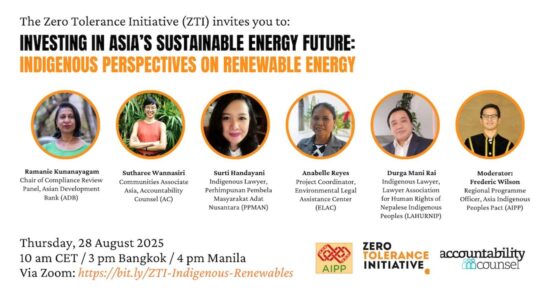Investing in Asia’s Sustainable Energy Future: Indigenous Perspectives on Renewable Energy

On 28 August 2025, Zero Tolerance Initiative (ZTI), Asia Indigenous Peoples Pact (AIPP) and Accountability Counsel co-organised an online panel discussion titled “Investing in Asia’s Sustainable Energy Future: Indigenous Perspectives on Renewable Energy.” Moderated by Frederic Wilson, Regional Programme Officer of AIPP, the event featured speakers Ramanie Kunanayagam, Chair of Asian Development Bank’s (ADB) Compliance Review Panel, Sutharee Wannasiri, Communities Associate Asia, of Accountability Counsel, Surti Handayani, Head of Division of Emergency Response and International Advocacy Division of PPMAN, Anabelle Reyes, Project Coordinator of Environmental Legal Assistance Center (ELAC), and Durga Mani Rai Yamphu, Head of Initiatives to Defend the Rights of Indigenous and Local Communities of LAHURNIP.
Discussion and lessons learnt
The online panel discussion examined the impacts of renewable energy projects in Asia financed by multilateral development banks (MDBs) and international financial institutions (IFIs), stressing the importance of Free, Prior and Informed Consent (FPIC) and Indigenous Peoples’ self-determination in shaping just and sustainable energy transitions.
Speakers highlighted that while renewable energy is often assumed to be “clean,” its impacts can be just as severe as conventional extractives. As Ramanie Kunanayagam explained, “impacts from renewable energy projects can be just as significant as oil and gas, especially where Indigenous land tenure is customary and unrecognized.” Sutharee Wannasiri added that “There is still a long road ahead to demand the MDBs and companies to remediate the harms that indigenous communities have suffered because of energy projects. Implementation of the agreements reached during the complaint process is slow and challenging, while reprisals against communities are common.”
Drawing on experiences from Indonesia, Surti Handayani pointed that there is a serious lack of recognition of Indigenous Peoples and manipulated consultation processes due to language and information gaps, while Anabelle Reyes reported that “FPIC is conducted but riddled with bribery and division, causing conflict within communities” in the Philippines. Indigenous lawyer Durga Yamphu warned that “the green energy transition has become a form of green colonisation for Indigenous Peoples.” Frederic Wilson reinforced these interventions, noting that Indigenous voices must be meaningfully heard, respected, and centred, and that renewable energy cannot come at the cost of Indigenous rights.
The discussion underscored that Indigenous Peoples are not passive victims but active knowledge and rights holders with their own sustainable practices. Community-led accountability processes have shown that agreements and remedies are possible, though often slow and contested. As participants reflected, solidarity networks, stronger recognition of customary rights, and genuine participation are critical to ensuring that Indigenous communities can shape the energy transition. The speakers emphasised that these lessons show the need to move beyond tokenistic consultation and toward true partnership.
Overall, the discussion highlighted that green energy must not replicate the injustices of extractive industries. Instead, a just transition requires meaningful FPIC, recognition of rights, and treating Indigenous Peoples as equal partners. Only then can renewable energy development become a pathway to justice, equity, and Indigenous self-determination.
Recommendations to States and Multilateral Development Banks (MDBs)
Speakers urged MDBs, and states to translate commitments into practice by:
- Guaranteeing FPIC as a binding right, not a procedural formality.
- Strengthening safeguards and ensuring implementation on the ground is in compliance with national and international human rights standards.
- Moving towards benefit-sharing models where Indigenous Peoples are partners, not beneficiaries.
- Protecting Indigenous rights defenders from reprisals and intimidations.
- Accelerating recognition of Indigenous land and territories, governance systems, and cultural heritage.

